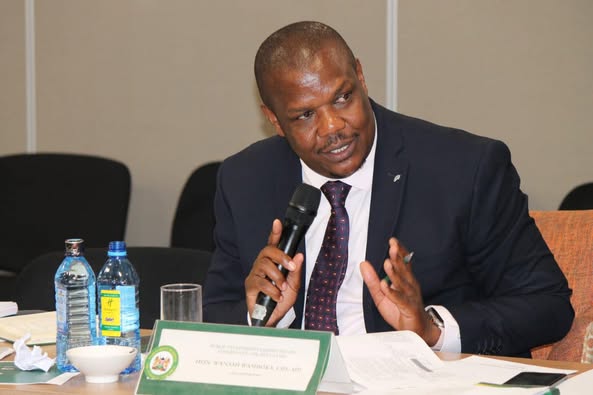
The Jack Wamboka-led Public Investments Committee on Governance and Education held a consultative meeting with various government agencies, including the National Transport and Safety Authority (NTSA), Kenya School of Law (KSL), and Kenya National Examinations Council (KNEC).
MPs addressing adverse findings flagged in the Auditor General’s reports, exposing financial mismanagement in the institutions, with project stagnation key among the issues of concern.
NTSA, led by Director General George Njau, were questioned on unaccounted land ownership, unsupported computer issuances to board members, and delayed implementation of the Smart Driving License Printing Solution.
Njau, in his submissions, admitted that 15 parcels of land used for motor vehicle inspection were not listed as assets in the authority’s financial statements.
He assured the lawmakers that efforts were underway to conduct valuations and officially incorporate the parcels in their financial records by June 30, 2025.
The audit report also revealed that NTSA had procured laptops for board members without a clear policy on issuance, security, or return. Lawmakers raised concerns over possible theft, misuse, and waste of public funds, calling for preventative measures to curb such irregularities.
Another pressing issue was the slow uptake of smart driving licenses. Despite the supplier delivering 4,042,050 smart cards at a cost of Kshs. 1.19 billion, only 1,479,176 cards had been printed in six years. This left a staggering 2,562,874 unutilised cards valued at Kshs.788 million sitting idle in NTSA stores.
Members also noted that the project, initially meant to last three years until March 2020, is now four years behind schedule, raising their fears of public funds being wasted.
The committee also criticised NTSA’s lack of equitable service distribution across Kenya, with some regions having numerous NTSA offices while others had none. Lawmakers called for affirmative action to ensure NTSA services are accessible in all 47 counties.
The National Cohesion and Integration Commission (NCIC), led by Dr. Samuel Kobia, was dismissed from the meeting after commissioners failed to appear, despite being summoned on issues raised by the Auditor General. Lawmakers expressed disappointment over their absence, warning that accountability in public institutions was not optional.
Kenya National Examination Council (KNEC), in their report, revealed undisclosed material uncertainty related to going concern. The Council recorded a deficit and has negative working capital, indicating insolvency with Outstanding Imprests of Kshs. 82,163,310 some dating back to 2018, with no evidence of recovery efforts.
The lack of reconciliations and supporting documentation for Kshs. 14,450,000 fuel expenses also raised the member’s eyebrows, wondering if the figures are cooked or genuine.
The Kenya School of Law (KSL) was on the spot over the delayed construction of an ultra-modern library and moot courts. A project that was supposed to be completed by September 2016 but remains unfinished seven years later down the line.
The project was awarded in 2013 for Kshs. 488 million and had already consumed Kshs. 358 million as of June 30, 2023. However, physical inspection revealed that work was still incomplete, despite the contractor remaining on-site.
In addition, management did not provide for audit verification of the site inspection and meeting minutes between the contractor, the school’s management, and the project manager. Further, no proper justification was made by the contractor for the delayed completion of the Moot Courts.
As the committee adjourned its session, it became evident that mismanagement, wastage, and inefficiency were systemic across government institutions.
The committee is expected to issue recommendations to streamline operations, enforce accountability, and ensure that taxpayer money is spent efficiently.